If you agree that there is an imperialist bloc of countries that dominates and controls the world, then Australia should be included. It may be a new and smaller entrant to the bloc, and it may be just a satellite of US imperialism in the Asia-Pacific, but it still fits the bill as part of the bloc.
And increasingly, the ruling strategists of Australian capital also see it that way. Australia has a general election tomorrow (21 May); it has one every three years (a leftover from its early days of democratic development) and the ruling National-Liberal Coalition government has been sounding the war bells. During the election campaign, Australia’s defence minister Peter Dutton told the country to “prepare for war”, capping what analysts have called a “khaki campaign” by Scott Morrison’s right-wing government. Dutton ramped up the rhetoric, telling Australians: “The only way you can preserve peace is to prepare for war and be strong as a country, not to cower, not to be on bended knee and be weak.”
And where is the threat of war to come from? China, of course. To counter what it sees as a threat from China, the Morrison’s government has in recent years sealed what is called the Aukus security pact with the US and UK and promised billions of dollars of defence and cyber security spending – all designed to resist the ‘threat’ of China – or to be more exact to follow the strategy of US imperialism to ‘contain’ and stop China becoming a rising economic power in the region and globally.
In the public opinion polls, ‘Trumpist’ Morrison trails Labor leader Anthony Albanese, with 54 per cent of voters backing the opposition compared with 46 per cent for the government, according to the latest Newspoll survey.
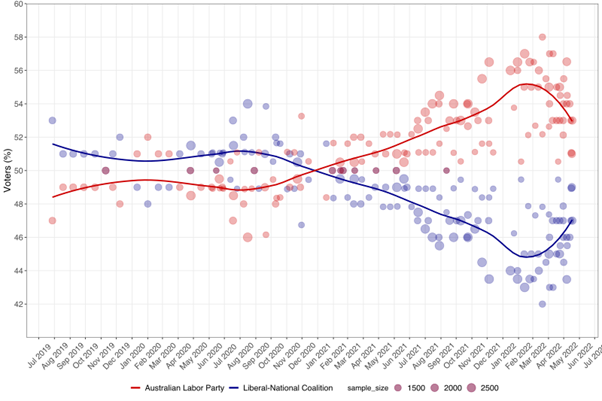
But don’t expect Albanese to alter Australia’s anti-China strategy. Labor fully backs the Aukus pact and if he wins, Albanese will join the meeting of the Quad — a security grouping of the US, Australia, India and Japan —which is due to take place in Tokyo only three days after Saturday’s election, with US president Joe Biden set to attend. Most analysts say that Biden “would be comfortable” with a Labor victory.
While the strategists of imperialism will be happy, Australia’s working people have more pressing problems. There are three issues dominating the election: the huge rise in house prices driven beyond the means of most Australians; the sharply rising cost of living where prices are rising much faster than wages; and climate change, with ever more destructive heatwaves, drought and floods affecting people’s lives.
Australia used to be called the ‘lucky country’ where people could emigrate to and start a new and prosperous life in an economy that had not suffered a recession of any note for decades. But the signs that this was changing have been there since the Great Recession of 2008-9 and subsequent Long Depression that ensued up to the COVID pandemic slump in 2020. After taking into account population growth, average annual real GDP per person grew by about 2% a year in Australia up to the Great Recession. However, since then, per capita growth has averaged half that rate.
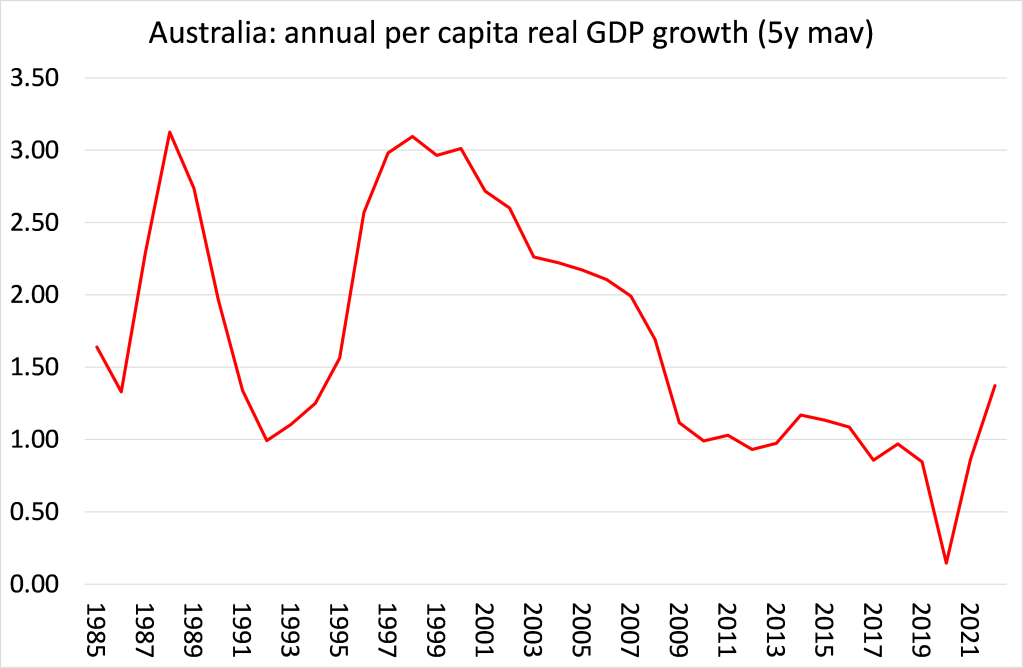
Of course, this is a phenomenon found in nearly all major advanced capitalist economies since the Great Recession, but it has affected the ‘lucky country’ too.
As elsewhere, the slowdown in economic growth can be connected to the slowdown in productive investment growth. Indeed, investment to GDP has declined sharply since the Great Recession.
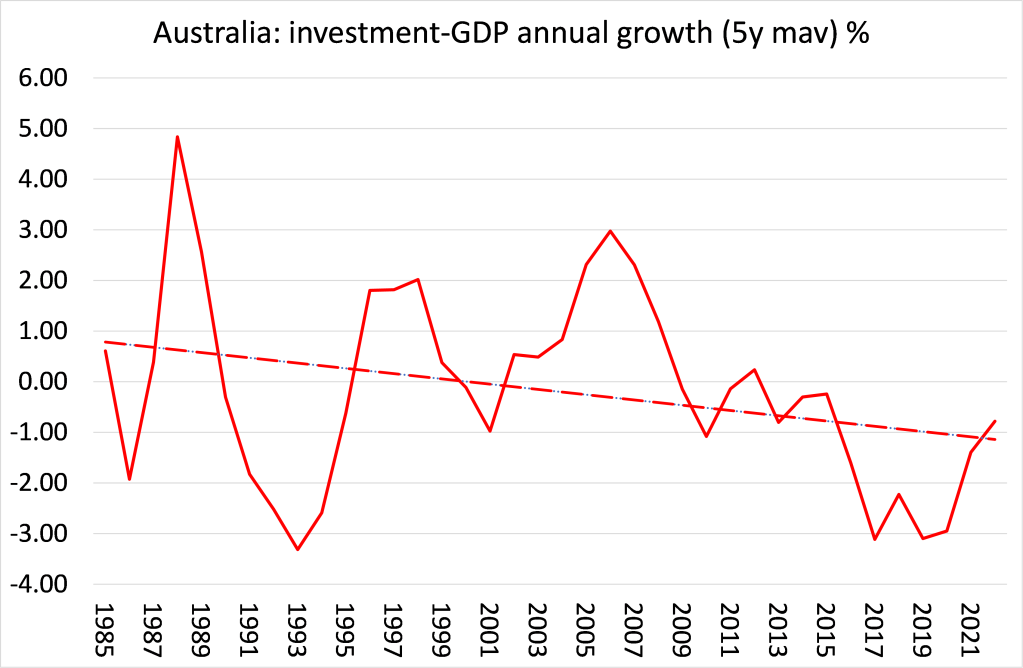
What lies behind the slowdown in real GDP and investment growth? It’s the same cause that applies to all the major capitalist economies in the last two decades: falling profitability of capital. The great boom and revival of profitability in Australian capital from the 1980s, led by Australia’s exploitation of resources in minerals, agricultural products and energy, and the huge expansion of a skilled workforce with ‘liberalised’ labour markets, started to falter in the late 1990s. And although there was a short uptick in profitability during the commodity boom up to 2010, driven by demand from China for Australia’s commodities, in the last decade, the decline in profitability resumed. Profitability is still as high as it was in the Golden Age of the 1960s (unlike most other major capitalist economies), but the trend is downwards.
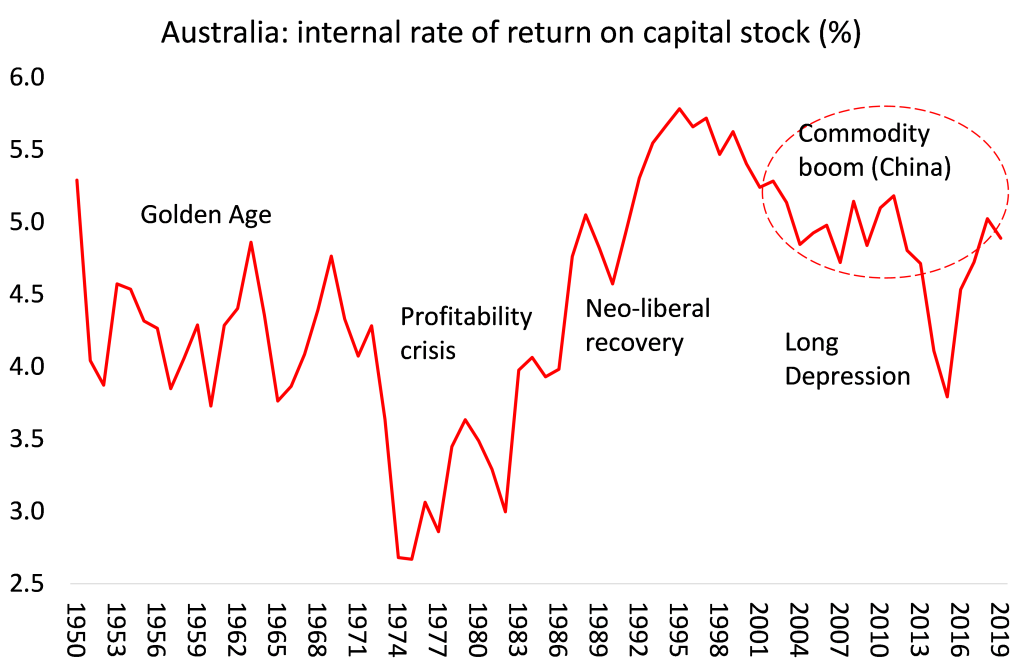
The irony in the sabre-rattling of the coalition government against China is that Australia had been ‘lucky’ because of its close proximity to China, the fastest growing economy over the last 25 years. As one commentator put it: “Australia was uniquely placed to benefit from China and Asia’s long-term growth by exporting resources, agricultural produce and services to the region”. Also the economy benefited from an influx of skilled labour through immigration from all parts but also immigrants who came with wealth of their own to invest.”
And Australia remains heavily dependent on its exports to China and world growth in general. Until the pandemic, China was the largest source of foreign investment in Australia, leapfrogging the US. But strategy of American imperialism is now overriding economic reality.
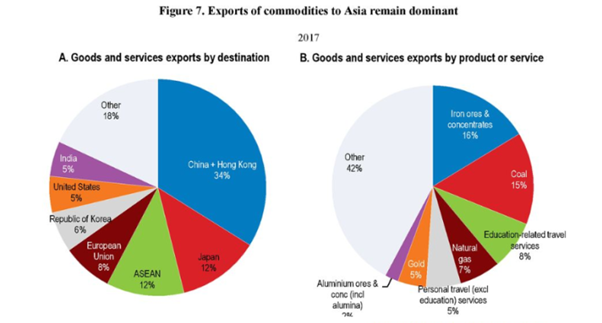
The domestic issues in the election campaign centre round the sharply rising rate of inflation – something hitting all the major capitalist economies – and with little prospect of any solution from either government or opposition. Inflation in the prices of goods and services in Australia is rising much faster than wages. The annual inflation rate is currently 5.1% (a 21-year high) and set to rise further, while average wages are rising at just 2.4%. So real wages are falling at a rate not seen for decades.
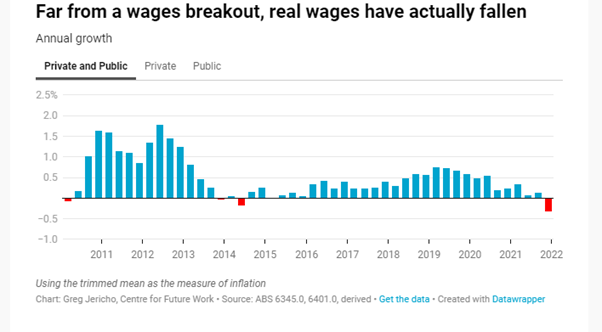
As in the US and Europe, the only answer offered by the authorities is for the Reserve Bank of Australia (RBA) to hike interest rates, while calling for wage restraint. The RBA has now increased interest rates (by 0.25% to 0.35%) for the first time in more than eleven years – and the first hike in the middle of an election campaign since 2007.
These rate rises threaten the homes of millions of Australians. The housing bubble had already reached shocking proportions.
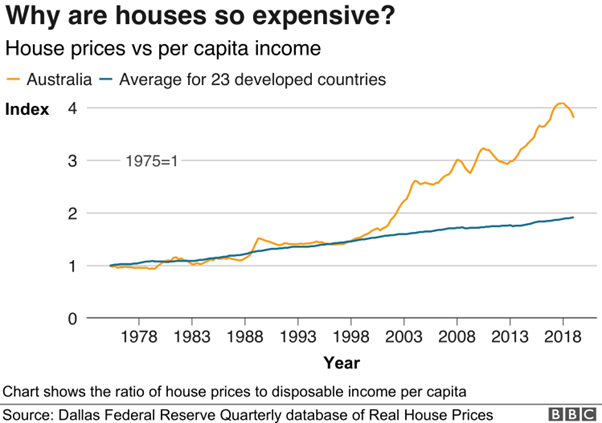
Australian households are now among the most indebted in the world. Chris Martin, a senior research fellow in UNSW’s City Futures Research Centre, said data from the Bank of International Settlements showed total credit to Australian households amounts to about 120% of annual GDP.
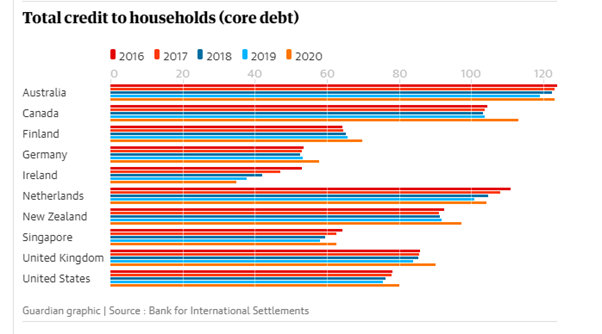
Major banks have already lifted interest rates for mortgages and other loans, matching the RBA’s 0.25 basis point increase. The RBA governor, Philip Lowe, said the cash rate could increase to 2.5% while investors are tipping it will rise to about 3.75% by May 2023. -If so, it’s estimated that 300,000 Australians could default on their mortgages as repayments increase. Each percentage point increase adds on average A$323 in monthly repayments, although some cities, such as Sydney are much higher at A$486, according to CoreLogic data. Car loans and credit card debt will also be more costly to repay at a time when the price for fuel and many other goods is rising, adding to families’ financial stress, Martin said.
Supposedly, the saving grace for Australians is ‘full employment’ to pay for these price rises.
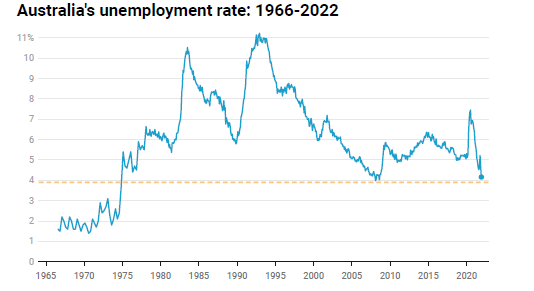
But the headline unemployment rate hides the reality that employment has not recovered yet from the pandemic slump. Prior to 2020, employment was growing around 4.2% every two years, but since then it has increased just 2.1% – in effect at half the speed it had been in the period up to the pandemic.
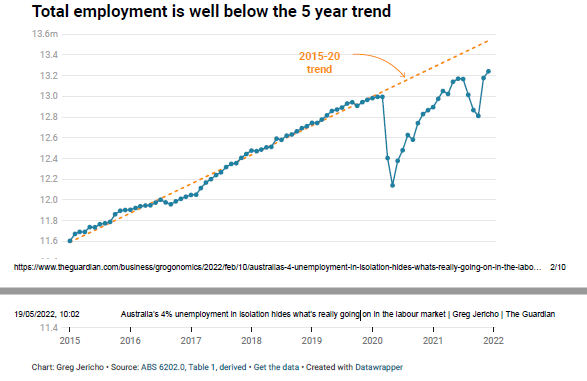
Moreover, the working age population beginning to stall.
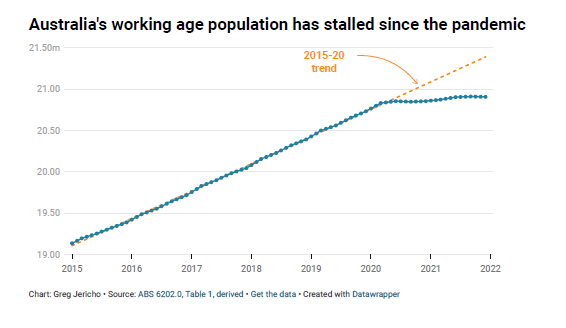
Australian capital is running out of more labour, especially as immigration restrictions have stopped net immigration expanding. The pool of working age people has barely grown at all.
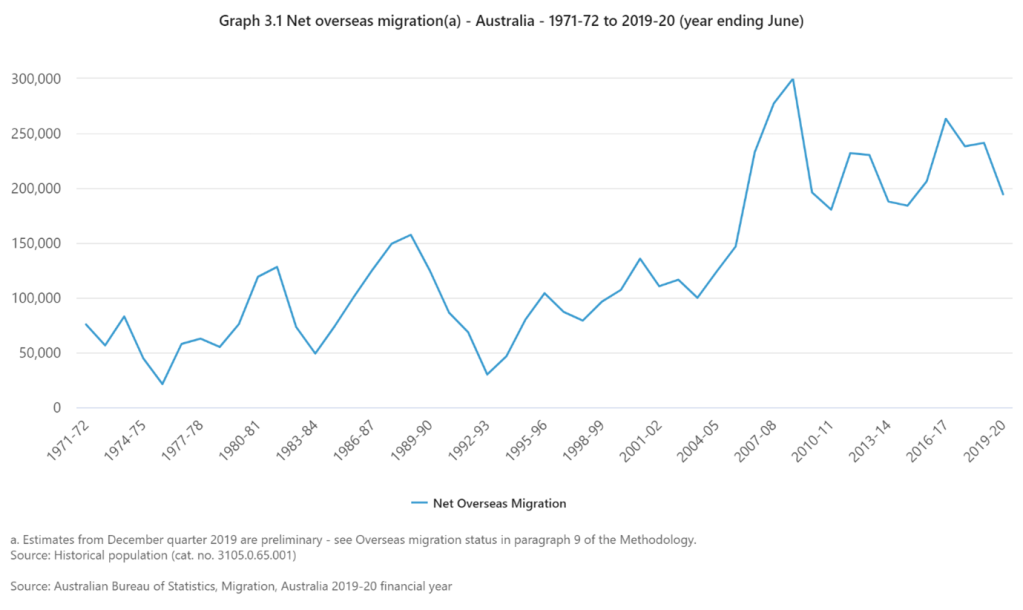
Increasingly, Australian capital must rely on boosting productivity growth to expand and raise profitability. But investment growth is dropping off and productivity growth has been in a downward trend.
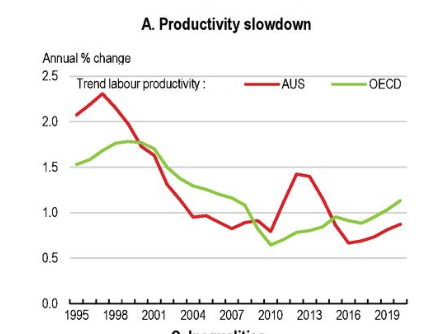
And on top of all this is the disaster of global warming and climate change that is beginning to hit Australia for a cricket six. Climate change in Australia has been a critical issue since the beginning of the 21st century. Australia is becoming hotter and will experience more extreme heat and longer fire seasons. In 2014, the Bureau of Meteorology released a report on the state of Australia’s climate that highlighted several key points, including the significant increase in Australia’s temperatures (particularly night-time temperatures) and the increasing frequency of bush fires, droughts and floods, which have all been linked to climate change.
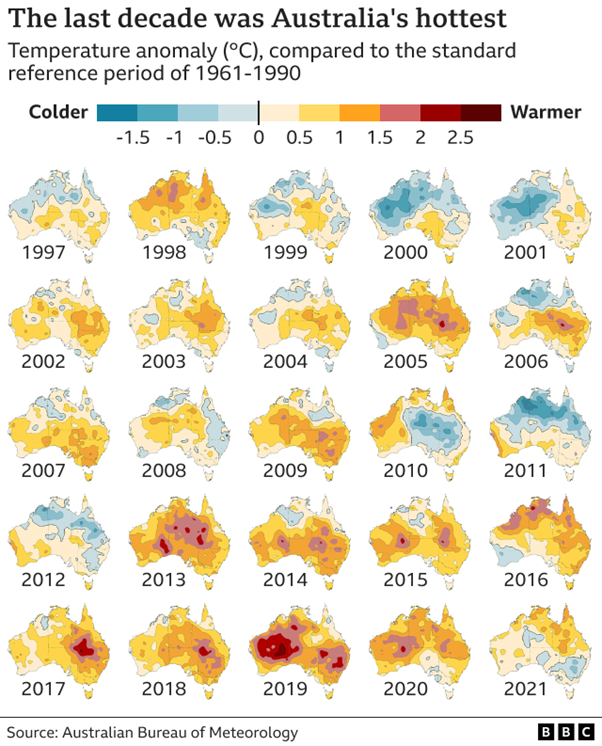
In the past three years, record-breaking bushfire and flood events have killed more than 500 people and billions of animals. Drought, cyclones and freak tides have gripped communities. Queensland has been ravaged by floods in recent months. In February, the state capital Brisbane had more than 70% of its average yearly rainfall in just three days. Australia is facing an “insurability crisis” with one in 25 homes on track to be effectively uninsurable by 2030, according to a Climate Council report. Another one in 11 are at risk of being underinsured.
Yet the economy depends very much on its fossil fuel exports and developing the mining industry. Non-renewable fossil fuels still account for about 85 percent of Australia‘s electricity generation. Australia is one of the world’s largest per capita emitters –producing some 1.3 percent of global carbon emissions with only 0.3 of the world’s population. For a nation so exposed to climate change, Australia remains one of the world’s biggest emitters per head of population. The government has promised to reduce emissions by 26% by 2030. Labor has pledged a 43% cut. Both promises are below the 50% recommended by the Intergovernmental Panel on Climate Change.
The Chinese economy has slowed down, and with it the demand for Australia’s exports. Anyway, the imperialist bloc wants Australia to disengage from China. The cost of living is rising sharply; rising interest rates risk a serious housing crisis; and global warming is out of control. Neither government nor opposition have any answers. Australia’s luck is turning for the worse.
if real wages have fallen, the normal rate of profit cannot have fallen unless there has been a big rise in the price of natural resources, which does not seem to have happened. So the decline in investment cannot be attributed to a lower normal rate of profit, it must be due to lower sales prospects. Lower sales may make the actual ex post rate of profit look as falling, but this is not the normal rate of profit Marx was worried about, it is actually an indication of the decree of utilization of capacity. The relevant rate of profit for investment is the normal one associated with normal capacity utilization, because new plants are built of the dimension that the investor expects will be normally i.e. efficiently utilized. So one should not confuse the influence on investment of expected sales with that of the normal rate of profits which is in all likelihood secondary.
If real wage start to fall the profits can rise and that may or may not push up profitability. Most likely profitability rose in 2021 and may do so this year but it would still be well down from the early 2000s.
Here and elsewhere we witness a total desengagemente twix the aims of the capitalistic production versus the aims of the hawks of war. These ones never cared a dam for the best interests of the populations even the small or medium businesses. This contradiction or clash has its costs and they won’t be mild.
These Anglo Saxon capitalists are certifiably mad. First they provoke a war in the Ukraine in a world still reeling from the pandemic, then Australia provokes its biggest customer China intending to become the Israel of the Pacific, America’s “unsinkable aircraft carrier”. English will always be associated with the last two Great Empires -The British Empire and The American Empire – which caused such great suffering to the peoples of this world. Unless we stop them, these out of control Anglo Saxon capitalists on their way out will take all of us with them.
As opposed to non Anglo-Saxon capitalists?
You are right of course, forgive me. I forgot China was building military bases and refurbishing airfields in Jamaica, Trinidad, Tobago, Haiti, Cuba, the Bahamas, Mexico, Nicaragua, Panama, Honduras, Belize, because that is what the US has done around China.
The US maintains approx 700, give or take 100, military bases around the world. None, however, are located in Mexico, Nicaragua, or Belize. All bases were closed in Panama in 1999 with the withdrawal of US military personnel.
All the bases in countries you do correctly identify were constructed before China entered the big picture as a capitalist competitor– and building a base in Honduras is hardly building a base “around” China.
But all that’s academic, of interest only to those who value historical accuracy. I quite agree that the capitalist bourgeoisie are a threat to human existence, and the more powerful the bourgeoisie, the greater the threat. But they’re not a threat because they are Anglo Saxon– that’s just reverse Aryanism. You suppose there’s a genetic basis for the US ruling class’ projection of military power? That’s not “scientific socialism” that’s pseudo-science.
” Neither government nor opposition have any answers. ”
They have answers but they are not the required answers.
The ALP attempted to redress the forces pushing the housing market along back in the 2019 election. It was severely rebuffed, having lost an election that was virtually unlosable and has taken to hiding its light under a bush. It has no courage of its convictions and doesn’t stand for much any different than the conservative parties if you believe their rhetoric.
Most people who read this blog, including its progenitor, kowtow to Chinese hegemony.
It is clear what Chinese intentions are in the south west Pacific. This is effectively the only direction in which China can exert its military and geostrategic power.
They have unilaterally declared the South China sea all the way down to the Indonesian archipelago their own waters. They have occupied and militarized islands in the South China Sea against international law.
They have recently signed an agreement with the Solomon Islands government giving them access to Solomon Islands waters and territory.
For two decades they sought to clandestinely influence the course of and corrupt the Australian polity. They did this by making contributions to political parties and operatives and even bought off ex government ministers to use as influencers. Revelations to this effect continue to this day.
The eventual encirclement of Australia is evident with an onward march to Antarctica.
The local Chinese cheer squad will no doubt be gleefully ecstatic.
Rech, this is an excellent piece of self-satire! Or maybe it’s aimed at the NYT?
Including the Solomon Islands, that makes for a potential of 5 military bases located outside the physical territory of China, as opposed to the 700, give or take 100 or so, the US maintains. But the Chinese +5 amounts to plans to dominate the world, while the US +700 is what? To defend democracy?
” Most people who read this blog, including its progenitor, kowtow to Chinese hegemony”
Care to back that up, quantify that “most people” or that just one more assertion you’re too busy to defend?
AC,
As far as I am concerned, one Chinese extra territorial base is one base too many, particularly on Australia’s doorstep.
It has developed and continues to develop its ability to project military power at an enormous pace.
Either it has such a surfeit of resources that it can squander them on extending its military capacity or perhaps it actually has plans for this burgeoning military capacity.
More like the later, I would say.
For two decades they sought to clandestinely influence the course of and corrupt the Australian polity. They did this by making contributions to political parties and operatives and even bought off ex government ministers to use as influencers. Revelations to this effect continue to this date
Did the Chinese offer bigger bribes than the Yanks? Do you have comparative figures?
I would prefer greenbacks rather than redbacks any day.
If we’re going to distribute the label of “imperialism” like candy, then we can firmly state there’s an Australian imperialism in Oceania (e.g. Solomon Islands, Fiji, etc.).
I remember when Brazil was in vogue during Lula, when some intellectuals from the rest of South America started to theorize about some “Brazilian Imperialism”.
The same thing is being told about Russia right now, after Zelensky threatened to nuke it. in mid-February 2022. Apparently, impeding NATO from installing low-altitude nukes at Russia’s southern frontier (by far its most vulnerable border), which would give the USA the capacity to break MAD, is “Russian Imperialism”.
Apparently, not wanting to be the next Yugoslavia is “imperialism”. Apparently, threatening a nuclear war is “a discourse for the liberation and self-determination of the oppressed peoples”. Apparently, having military bases and whole fleets with aircraft carriers (which are useless for defensive warfare; they’re essentially offensive weapons) on another country’s littoral is “defending freedom of navigation” and not “imperialism”.
Honestly, what we’re observing in our present times is not only the collapse of capitalism, but also the collapse of nationalism, which was the dominant ideology of the post-war 20th Century. Nowadays, being a nationalist has more to do with asking military help from the Americans in exchange for God-knows-what (oil? Privatizations?) than really liberating your people; wars of independence of the 20th Century have degenerated into proxy wars of the 21st Century. Farce is the first-born daughter of Tragedy.
A.C. sorry you missed my satire concerning D.C. and the Carribean.
Let me use an analogy. Imagine we are worker hunters in the jungle tracking capitalist beasts. The largest has been wounded, its bleeding, its time is running out. I would advise my co-workers to focus on the wounded and desperate beast as that is likely to be the direction of attack. You would say they are all the same.
Look I subscribe to the slogan “Neither Beijing, Brussels nor Washington”. But this does not absolve me from analysing the immediate threat.
I see that the oversight body in the USA says the US energy system is in need of $2 trillion to refurbish and upgrade. 160 million people in the US have been warned of potential blackouts this summer. So how about the slogan,
700 military bases over there.
Not enough power stations over here.
You just gave an object lesson in the limitations of analogy. We are not in a jungle. We are not dealing with isolated, individual “beasts” in separate, and separated areas of the non-jungle. Other than that, everything you posit is spot on.
Except your ability to create targeted, believable, and therefore entertaining, satire.
Rech’s wildly hysterical fear of China is not personal. It reflects the pathology of the racialised political economy of an imperial system whose roots go back to the 1492 invasion and rape of the New World and is now suicidally/homicidally/ecocidally fighting against humanity for its life. We have to understand the Ukrainian situaltion from this perspective, which is clearly China’s, Cuba’s, Venezuela’s, Nicaragua’s, and even Russia’s in spite of its present leaders.
Addendum: Russia lines up with the existing (transitional) socialist states because (1) historically it is a peripheral nation. (2) Putin is of the generation of bureacrats who decided to deprive capitalism of its (socialist) “enemy” and, in the process, precipitated a near literal extinction because was there was no viable world capitalist club to join. New capitalist Russia was merely another colonized object of rapist thugs called bankers, oligarchs, etc. The neoliberal imperial order, which seemed so enticing to desperate ruling elites everywhere, really represents capitalism in extremus: no room anymore for even capital, let alone ambitious Russians. The Chinese communists learned to game the game, which is now ended. It’s not socialism or barbarism any more. Russia’s choice is now humanity’s choice: socialism or extinction.
The “addendum” hopefully cleansed of typos reads:
Addendum: Russia lines up with the existing (transitional) socialist states because (1) historically it is a peripheral nation. (2) Putin is of the generation of bureaucrats who decided to deprive capitalism of its (socialist) “enemy” and, in the process, precipitated a near literal extinction because there was no viable world capitalist club to join. New capitalist Russia was merely another colonized object of rapist thugs called bankers, oligarchs, etc. The neoliberal imperial order, which seemed so enticing to desperate ruling elites everywhere, really represents capitalism in extremis: no room anymore for even capital, let alone ambitious Russians. The Chinese communists learned to game the game, which is now ended. It’s not socialism or barbarism any more. Russia’s choice is now humanity’s choice: socialism or extinction.
The “addendum” hopefully cleansed of typos reads:
Addendum: Russia lines up with the existing (transitional) socialist states because (1) historically it is a peripheral nation. (2) Putin is of the generation of bureaucrats who decided to deprive capitalism of its (socialist) “enemy” and, in the process, precipitated a near literal extinction because there was no viable world capitalist club to join. New capitalist Russia was merely another colonized object of rapist thugs called bankers, oligarchs, etc. The neoliberal imperial order, which seemed so enticing to desperate ruling elites everywhere, really represents capitalism in extremis: no room anymore for even capital, let alone ambitious Russians. The Chinese communists learned to game the game, which is now ended. It’s not socialism or barbarism any more. Russia’s choice is now humanity’s choice: socialism or extinction.